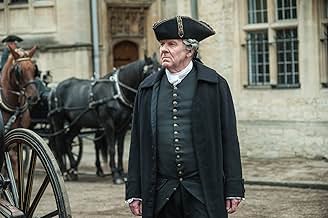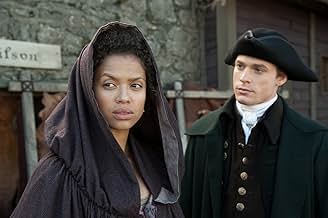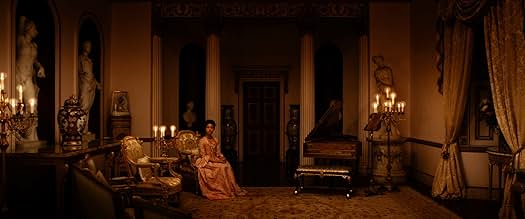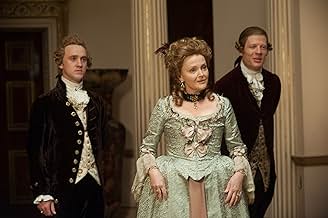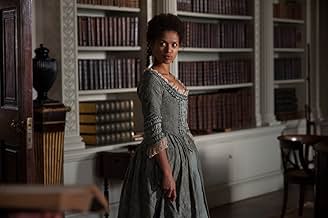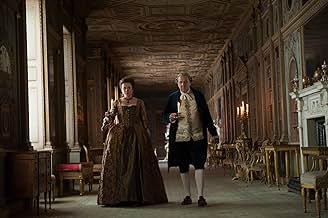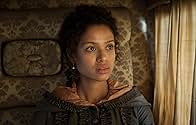PUNTUACIÓN EN IMDb
7,3/10
34 mil
TU PUNTUACIÓN
Sigue la historia de Dido Elizabeth Belle, quien es criada por el aristocrático tío abuelo Lord William Murray, primer conde de Mansfield en la Inglaterra del siglo XVIII. .Sigue la historia de Dido Elizabeth Belle, quien es criada por el aristocrático tío abuelo Lord William Murray, primer conde de Mansfield en la Inglaterra del siglo XVIII. .Sigue la historia de Dido Elizabeth Belle, quien es criada por el aristocrático tío abuelo Lord William Murray, primer conde de Mansfield en la Inglaterra del siglo XVIII. .
- Premios
- 13 premios y 32 nominaciones en total
Argumento
¿Sabías que...?
- CuriosidadesIn real life, Lady Elizabeth Murray married first to George Finch-Hatton, 10th Earl of Winchilsea. Their great-grandson was Denys Finch Hatton, who was played by Robert Redford in Memorias de África (1985).
- PifiasThe character Oliver Ashford states he has a commission in the Royal Navy purchased for him. Impossible as commissions have never been sold in the RN, which at the time was the nearest thing to a meritocracy the world had seen. Grease a few palms to get him in as a midshipman? Maybe. As a captain, never. Fleet boards had to be sat, idiots weeded out. Commissions could be bought and sold in the cavalry and infantry but not, for instance, in the Royal Engineers. Soldiers could be lost to incompetence but not ships or bridges. Far too valuable.
- Citas
Dido Elizabeth Belle: My greatest misfortune would be to marry into a family who would carry me as their shame.
- ConexionesFeatured in Belle: The Story (2014)
- Banda sonoraPiano Suite in G Minor, HWV 439, Allemande
Composed by George Frideric Handel
Reseña destacada
In years hence, audiences will be able to point to this film, as the moment the world knew Gugu Mbatha-Raw was going to be big. Belle is Amma Asante's feature-length directorial debut, and her work here is astonishingly confident. Tackling a period piece may seem daunting to most, but in Asante's case, she has the benefit of a top-notch cast, and a truly fascinating story. Loosely based on the story of Dido Elizabeth Belle, Dido was the daughter of an enslaved African woman and an English admiral.
As the film begins, although she is born illegitimate, Dido's father (Matthew Goode, Stoker) gives her over into the care of his great-uncle, William Murray, the first Earl of Mansfield (Tom Wilkinson), who acts as the Lord Chief Justice of the British courts. As she grows into a young woman, Dido's life at the palatial estate of Kenwood is full of mixed blessings. While her uncle and aunt (Emily Watson, Breaking the Waves) treat her as if she were their own—they raise her alongside their other niece, Elizabeth Murray (Sarah Gadon, A Dangerous Method)—social conventions of eighteenth century society are immovable; no matter how much they love her, Dido feels the sting of being forced to eat with the servants, when company comes calling.
The greatness of the film comes in its intricate plotting, and in the parallels drawn between gender and race. Author Jane Austen dealt with the position of women in English society through the use of dry humor—though the rage at a young woman being forced into marriage in order to secure a safe future was always very much present. In Belle however, there is no satire to soften the blow. As Elizabeth comes out, venturing to London in search of a husband, she points out to Belle the inherent unfairness of a system that allows women to be treated as male property. Dido doesn't necessarily have the problem of a search for a husband, as the inheritance of her father's fortune ensures that she is financially secure; but for a radiant young woman in the prime of her life, her uncle's insistence on keeping her out of sight understandably rankles her.
Matters are complicated by the arrival of John Davinier (Sam Reid), the son of a local clergyman. Ambitious and wide-eyed, John wants to try to rise in station, training with Lord Mansfied to become a lawyer. His outspoken, radically abolitionist views on a notorious legal case Lord Mansfield is trying annoy the Lord considerably; but he rouses all the passionate feeling in Dido that she has been forced for so long to suppress.
As Lord Mansfield, Wilkinson (Batman Begins, Michael Clayton) plays the exasperated father figure with the correct touches of humor and warmth. As a judge, he projects the inner conflicts of a man with the weight of the entire economic system on his shoulders; you can see him try to deflect from the strong-arming of local politicians, who want to ensure that the presence of the "mulatto" in his house will not affect his ruling on the case. As Elizabeth, Gadon takes what could have been a very stereotypical role of the flighty, romantic English girl, and brings a deep sense of hurt to it. Having been left with her uncle after her new stepmother successfully wrote her out of her father's will, Elizabeth's cheery exterior hides an emotionally hurt young girl.
And finally, there is Mbatha-Raw. As Dido, the engine that drives the film, you may deeply feel her two-fold frustration as a woman, and as a person of color. You will be carried away by her passion—her belief that things should not remain the same. On a more general level, the camera absolutely adores her. She moves and projects with a vitality and ease that forces one to stop at several points. Her characterization and her performance are so accomplished, that her independent-minded heroine could stand toe-to-toe with the multiple incarnations of Jane Austen's Elizabeth Bennett. If Belle is any indication, and if there is any fairness in this world, there should be more great things to come from her.
-Nick Kostopoulos - See more at: http://www.mediumraretv.org
As the film begins, although she is born illegitimate, Dido's father (Matthew Goode, Stoker) gives her over into the care of his great-uncle, William Murray, the first Earl of Mansfield (Tom Wilkinson), who acts as the Lord Chief Justice of the British courts. As she grows into a young woman, Dido's life at the palatial estate of Kenwood is full of mixed blessings. While her uncle and aunt (Emily Watson, Breaking the Waves) treat her as if she were their own—they raise her alongside their other niece, Elizabeth Murray (Sarah Gadon, A Dangerous Method)—social conventions of eighteenth century society are immovable; no matter how much they love her, Dido feels the sting of being forced to eat with the servants, when company comes calling.
The greatness of the film comes in its intricate plotting, and in the parallels drawn between gender and race. Author Jane Austen dealt with the position of women in English society through the use of dry humor—though the rage at a young woman being forced into marriage in order to secure a safe future was always very much present. In Belle however, there is no satire to soften the blow. As Elizabeth comes out, venturing to London in search of a husband, she points out to Belle the inherent unfairness of a system that allows women to be treated as male property. Dido doesn't necessarily have the problem of a search for a husband, as the inheritance of her father's fortune ensures that she is financially secure; but for a radiant young woman in the prime of her life, her uncle's insistence on keeping her out of sight understandably rankles her.
Matters are complicated by the arrival of John Davinier (Sam Reid), the son of a local clergyman. Ambitious and wide-eyed, John wants to try to rise in station, training with Lord Mansfied to become a lawyer. His outspoken, radically abolitionist views on a notorious legal case Lord Mansfield is trying annoy the Lord considerably; but he rouses all the passionate feeling in Dido that she has been forced for so long to suppress.
As Lord Mansfield, Wilkinson (Batman Begins, Michael Clayton) plays the exasperated father figure with the correct touches of humor and warmth. As a judge, he projects the inner conflicts of a man with the weight of the entire economic system on his shoulders; you can see him try to deflect from the strong-arming of local politicians, who want to ensure that the presence of the "mulatto" in his house will not affect his ruling on the case. As Elizabeth, Gadon takes what could have been a very stereotypical role of the flighty, romantic English girl, and brings a deep sense of hurt to it. Having been left with her uncle after her new stepmother successfully wrote her out of her father's will, Elizabeth's cheery exterior hides an emotionally hurt young girl.
And finally, there is Mbatha-Raw. As Dido, the engine that drives the film, you may deeply feel her two-fold frustration as a woman, and as a person of color. You will be carried away by her passion—her belief that things should not remain the same. On a more general level, the camera absolutely adores her. She moves and projects with a vitality and ease that forces one to stop at several points. Her characterization and her performance are so accomplished, that her independent-minded heroine could stand toe-to-toe with the multiple incarnations of Jane Austen's Elizabeth Bennett. If Belle is any indication, and if there is any fairness in this world, there should be more great things to come from her.
-Nick Kostopoulos - See more at: http://www.mediumraretv.org
- MediaPanther
- 8 may 2014
- Enlace permanente
Selecciones populares
Inicia sesión para calificar y añadir a tu lista para recibir recomendaciones personalizadas
- How long is Belle?Con tecnología de Alexa
Detalles
- Fecha de lanzamiento
- País de origen
- Sitios oficiales
- Idiomas
- Títulos en diferentes países
- Белль
- Localizaciones del rodaje
- Empresas productoras
- Ver más compañías en los créditos en IMDbPro
Taquilla
- Presupuesto
- 10.900.000 US$ (estimación)
- Recaudación en Estados Unidos y Canadá
- 10.726.630 US$
- Fin de semana de estreno en EE. UU. y Canadá
- 106.578 US$
- 4 may 2014
- Recaudación en todo el mundo
- 16.607.575 US$
- Duración1 hora 40 minutos
- Color
- Mezcla de sonido
- Relación de aspecto
- 2.35 : 1
Contribuir a esta página
Sugerir un cambio o añadir el contenido que falta

Principal laguna de datos
By what name was Belle (2013) officially released in India in Hindi?
Responde






